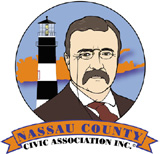NASSAU COUNTY CIVIC ASSOCIATION, INC.
"The government is us, we are the government, you and I." Teddy Roosevelt

|
NASSAU COUNTY CIVIC ASSOCIATION, INC. "The government is us, we are the government, you and I." Teddy Roosevelt |
 |
Before the House Budget Committee Democratic Caucus, Senate Democratic Policy Committee
Thank you for this opportunity to speak about the promise of No Child Left Behind. I must stress that the views I express are entirely my own, and should not be construed as representing any official position of The Heritage Foundation.
It has been about 18 months since the passage of the bill, and much has happened. Since January 2002:
These accomplishments are even more significant when one considers that only 11 states were in compliance with the 1994 Elementary and Secondary Education Act six years after its enactment.
NCLB is making a difference, but you do not have to take my word for it. Newspapers, educators, parents, and elected officials are talking about the good news:
The shift towards accountability has been accompanied by a massive increase in federal funding. Current discretionary funding for federal education is the largest amount ever appropriated. Title I, Special Education, and other programs have seen large increases during the past two years. In fact, Title I spending increased more during this Administration’s first two years than during the previous eight years under the former administration.
Since the law’s enactment, Congress has sent $771.5 million to states to design and implement their annual testing programs, and President Bush has asked an additional $390 million for next year. Two recent studies suggest this will be more than adequate.
While the increase in federal spending is considerable, we need to remember that money is not everything. Total federal, state, local, and private spending for education exceeds $420 billion a year. Yet nearly six in 10 high school seniors lack even a basic knowledge of American history, and more than half of the nation’s low-income 4th graders cannot read at a basic level.
Despite the fact that Americans spend more on education than most industrialized nations, our children have fallen behind many of their international peers on tests of core academic knowledge, particularly in math and science.
The evidence suggests that there is little reason to expect that increasing funding will improve the situation. The National Research Council summed up its findings in this regard in Making Money Matter: Financing America’s Schools, a 1999 report commissioned by the U.S. Department of Education. It concluded that “additional funding for education will not automatically and necessarily generate student achievement and in the past has not, in fact, generally led to higher achievement.”
Eric Hanushek of the University of Rochester has conducted several studies of the effects of spending on achievement and has concluded that there is no relationship.
Sadly, over $120 billion in federal dollars has been spent on Title I programs for low-income students since 1965, yet the achievement gap between low-income students and their peershas not closed.
This is why reform is so important. The public and parents are keenly aware of this fact. On the latest Winston Group poll, a majority of respondents said that they believed raising standards was more important to improving public education than increasing funding. The poll found almost unanimous support for the tenets of NCLB -- including annual report cards, highly qualified teachers, and requiring schools to set and meet annual goals. A majority also supported the school choice requirements.
A new Business Roundtable poll found a similar support for disaggregation and accountability.
The support for accountability and reform is strong. The combination of increased funding and strong accountability standards in NCLB hold the potential for a promising future.
---
The Heritage Foundation is a public policy, research, and educational organization operating under Section 501(C)(3). It is privately supported, and receives no funds from any government at any level, nor does it perform any government or other contract work.
The Heritage Foundation is the most broadly supported think tank in the United States. During 2002, it had more than 200,000 individual, foundation, and corporate supporters representing every state in the U.S. Its 2002 contributions came from the following sources:
Members of The Heritage Foundation staff testify as individuals discussing their own independent research. The views expressed are their own, and do not reflect an institutional position for The Heritage Foundation or its board of trustees. |